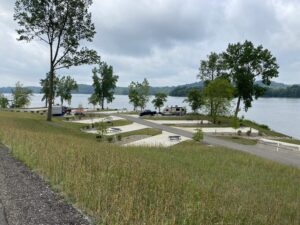
INDUSTRY TRENDS
Navigating Zoning and Permits for Campgrounds
March 13, 2024 | WRITTEN BY: Environmental Design Group
Zoning Regulations
The first step is to research the zoning regulations in your area. Campgrounds are often classified under recreational or commercial zoning. Make sure to check with your local zoning board to confirm the designation and permitted uses. Many areas have specific ordinances related to campgrounds and RV parks. The rules may dictate things like:
· Density regulations - Rules regarding how many campsites are allowed per acre. This impacts the total number of campsites allowed.
· Setbacks - Distance campsites must be from property lines, internal roads, structures, etc.
· Campsite size - Many areas require minimum sizes for RV/tent campsites. This includes the camp pad and surrounding buffer space.
· Access roads - Regulations may dictate minimum road width, turnaround radius for RVs, and road material (gravel, pavement, etc).
· Parking - Rules for parking at each campsite pad as well as visitor/overflow parking areas.
· Stormwater - Campgrounds are often designed with large areas of impervious surfaces, so proper management of stormwater is key. Many jurisdictions require drainage plan submittals to show how stormwater will be directed through proper grading and ditches/swales.
· Floodplain rules - Special rules apply if the campground is within a mapped 100-year floodplain.
· Noise limits - Limits on loud music, parties, dogs, ATVs, etc. to prevent campground disruptions.
· Lighting - Regulations on lamp styles and brightness to reduce light pollution in rural campgrounds.
· Signage - Rules pertaining to entrance, wayfinding, road, and site identification signs.
Campground Regulations
In addition to specific zoning requirements, many states have additional rules for campground development that may fall under the Department of Public Health, the state Administrative Code, Environmental Health, and more. These rules regulate things like drinking water safety, pool standards, adequate restroom facilities, sewage disposal, food handling, and general sanitation practices. Examples include:
· Restrooms - Requirements for the number of restrooms based on campground capacity. This includes toilets, showers, sinks, and laundry facilities.
· Site Utilities - Regulations surrounding water, electric, and sewer, with specific requirements regarding computations for water supply and sewage disposal, campsite utility hook-ups, dump stations, water and wastewater treatment systems, and more.
· Fire pits - Rules about fire pit placement and design, plus overall campfire safety.
· Pool standards - Rules for any swimming pool regarding fencing, health standards, lifeguards, etc.
Sign-off from the aforementioned agencies confirms that appropriate health and hygiene standards have been met for seasonal and overnight campground guests.
Building and Site Utility Permits
Once zoning is confirmed and the applicable planning and design requirements are identified, the next step is obtaining proper building and site utility permits. Development permits are required for installing new structures, making improvements to land, building utility hookups, and other campground construction. Key permits may include:
· Land use/development permit - Approves overall campground site plan.
· Building permits - Required for bathrooms, community buildings, camp store, etc.
· Electrical, plumbing, and mechanical permits.
· Road and access permits - For driveways and internal roads.
· Fire inspection - Reviews safety of electrical and emergency access.
· Health department - Approves food service and swimming facilities.
· Water supply and sewage disposal permits.
The permit process ensures campgrounds meet all code and safety requirements. All inspections must be completed and approved before opening for operation.
Timing and Cost Considerations
It's important to research and account for the potential time and expenses related to zoning and permits. The processes can take 4-12 months based on the location, site conditions, and scope of the campground development. Application fees, impact fees, inspections, and any environmental reviews also add to costs. Attempting to open without proper permits and approvals leaves the owner open to potential fines and can significantly delay construction.
With proper planning and research, these regulatory steps are manageable. Seeking guidance from local zoning officials, permit offices, and professionals to integrate applicable requirements into the campground plan as early as possible will help streamline and simplify the construction process, helping you achieve your goals in a timely manner.
RELATED TAGS:
[xyz-ips snippet=”comment-form”]




